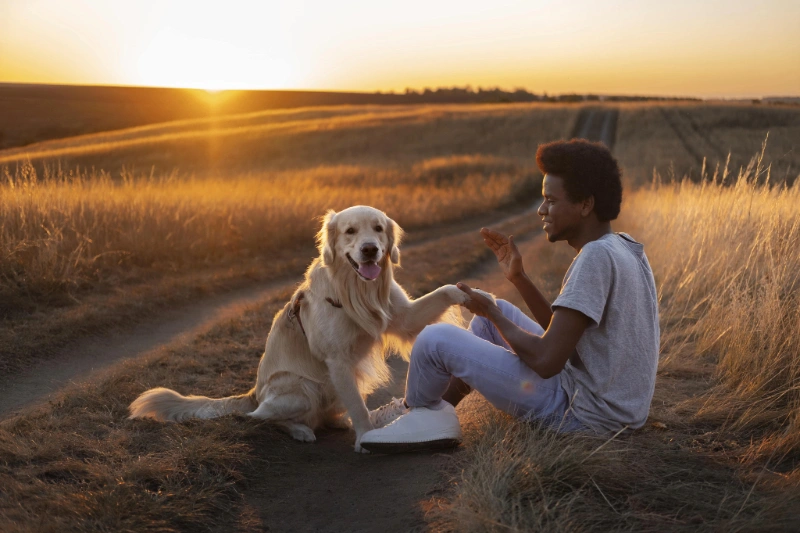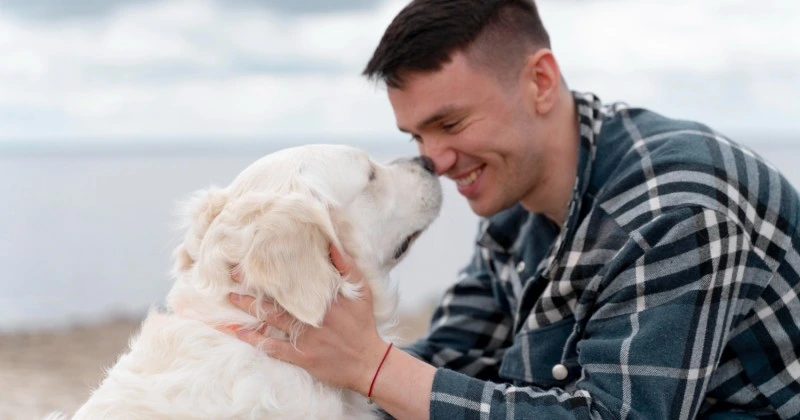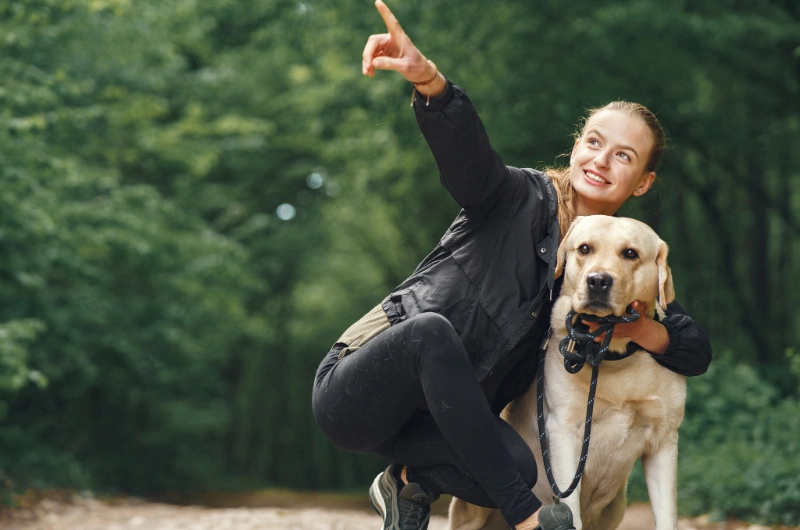Table of Contents
Introduction
Welcome to all animal lovers, where the great “dogs vs. cats” debate never truly seems to end! Whether you’re a dedicated dog person, a cat enthusiast, or somewhere in between, there’s no denying that both animals bring joy and companionship into our lives. However, today we’re taking a moment to dive into why are dogs better than cats, often winning our hearts with their boundless loyalty, energy, and unwavering love. From their playful antics to their protective instincts, dogs truly shine in so many ways. In this post, we’ll share 50 unique reasons why dogs are often considered man’s best friend.
The Special Bond Between Humans and Dogs

A Friendship Like No Other
The connection between humans and dogs dates back thousands of years. From being our hunting partners to acting as protectors, dogs have stood by our side in countless ways. It’s no wonder that they’re often called “man’s best friend.”
I remember a time when my dog, Rusty, comforted me on a tough day. After a particularly stressful meeting, I walked through the door, and there he was, wagging his tail, eager to see me. It’s that pure joy and unwavering companionship that make the bond with dogs so special.
Why the Dog-Human Connection Is Unique
Studies have shown that the relationship between dogs and humans goes beyond mere companionship. When we interact with dogs, our brains release oxytocin, a hormone associated with bonding and affection. This mutual communication creates a special emotional connection that’s hard to replicate with any other pet. The companionship we share with dogs involves understanding, empathy, and a silent conversation through body language and shared experiences.
Why Are Dogs Better Than Cats? 50 Facts That Prove It

Loyalty & Companionship
1. Unmatched Loyalty
Dogs are often described as the most loyal pets. Their loyalty isn’t just about following commands; it’s about their unwavering commitment to their owners. Whether you’re happy, sad, or just sitting quietly at home, dogs are always there by your side, offering comfort and love.
2. Excited Greetings
Every time you walk through the door, dogs greet you with enthusiasm that can turn even the worst day around. Their wagging tails, jumping, and eager smiles show just how much they cherish your return, making every moment feel like a reunion.
3. Daily Exercise Buddy
Owning a dog is one of the best ways to stay active. Dogs need regular walks, and this daily exercise routine benefits both you and them. Their energy encourages you to get outside and walk, jog, or even hike, helping to improve your physical health while strengthening your bond with your furry friend.
4. Social Icebreakers
Walking a dog in the park or along the street is a natural conversation starter. People are drawn to dogs, and it becomes easier to meet new people or strike up a friendly conversation. Whether it’s chatting with other dog owners or just getting a compliment about your dog’s cuteness, it’s a social advantage for any dog owner.
5. Easy to Train
Dogs are highly trainable and love to learn. From teaching them basic commands like “sit” and “stay” to more complex tricks like fetching your slippers, dogs respond well to positive reinforcement. This makes them easy to train and gives owners the satisfaction of teaching their pets new skills.
6. Natural Protectors
Dogs are instinctively protective of their families. Whether it’s alerting you to a potential intruder or simply staying close to keep you safe, their guarding instincts are deeply ingrained. They also serve as great watchdogs, alerting you to unfamiliar sounds or movements.
7. Service Animals
Dogs are trained to assist people with various disabilities, such as vision impairment, mobility challenges, and even psychological conditions. Guide dogs help people navigate the world, while therapy dogs provide emotional support in hospitals, schools, and care facilities.
8. Emotional Support
Dogs have an uncanny ability to sense when their owners are sad, anxious, or upset. When you’re having a tough day, they will often come to you, snuggle, or simply sit by your side, offering silent but comforting companionship.
9. Interactive Play
Dogs love to play, and this interactive play is a wonderful way to engage with them. Games like fetch, tug-of-war, or hide-and-seek keep both you and your dog entertained, while also strengthening the bond between you two.
10. No Litter Box
Unlike cats, dogs do not require a litter box. They take care of their business outside, which means there’s no need for cleaning up after them indoors. This makes owning a dog much easier for people who prefer to keep their homes clean and free from the scent of a litter box.
Health & Wellness

11. Breed Variety
There’s a dog breed for just about every lifestyle. Whether you want a small lap dog or an active working dog, there are endless breeds to choose from. This variety ensures that there’s a dog suitable for any living situation or personality.
12. Friendly with Strangers
Generally, dogs are more sociable than cats. They are eager to meet new people and are often quite friendly toward strangers. This sociable nature makes them excellent companions for individuals or families looking for an affectionate, approachable pet.
13. Mood Boosters
A dog’s playful antics, wagging tail, and affectionate nature can instantly lift your spirits. Whether they’re fetching a ball or simply cuddling with you, dogs have an innate ability to bring joy, laughter, and happiness to any home.
14. Adaptable Pets
Dogs are incredibly adaptable. Whether you’re moving to a new city, welcoming a new family member, or changing your routine, dogs quickly adjust to new environments and schedules. This makes them ideal pets for those with ever-changing lifestyles.
15. Work Companions
Dogs have been helping humans with work tasks for centuries, from herding livestock to assisting with search and rescue operations. Their role as working companions has only evolved, with some dogs even serving in the military or as police dogs.
16. Medical Detection
Dogs have an extraordinary sense of smell that allows them to detect medical conditions like seizures, low blood sugar, or even the early stages of diseases like cancer. Some trained dogs can alert their owners before symptoms even appear.
17. Active Lifestyle
Dogs encourage an active lifestyle by prompting daily walks and outdoor adventures. Whether it’s a morning jog, hiking in the mountains, or simply playing catch in the backyard, dogs motivate you to stay active and fit.
18. Eager to Please
Dogs love to please their owners. They enjoy following commands and learning new tricks, and they thrive on positive reinforcement. This eagerness to please makes them responsive to training, making dog ownership a rewarding experience.
19. Less Destructive
Unlike cats that may scratch furniture or mark territory indoors, dogs are generally less destructive. While they might chew on toys or shoes if not given appropriate outlets, dogs tend to respect boundaries and are less likely to create messes in the house.
20. Home Security
A dog’s presence can act as a deterrent to potential burglars or intruders. Their keen senses alert them to anything unusual, and they often provide a sense of safety and security to their owners. Plus, their barking at the door is a natural alarm system!
Family & Social Life

21. Expressive Faces
Dogs communicate through their facial expressions and body language. They are incredibly expressive, using their eyes, ears, and tail to convey emotions. Whether they’re happy, excited, or even anxious, a dog’s face can say a lot about how they’re feeling.
22. Family-Oriented
Dogs love being part of a family. They thrive in a home where they are treated as a valued member of the pack. Their affectionate nature makes them excellent companions for families of all shapes and sizes.
23. Stress Relief
Studies have shown that spending time with dogs can significantly reduce stress and anxiety. Their calming presence, combined with the unconditional love they provide, helps lower blood pressure and boost emotional wellbeing.
24. Travel Companions
Many dogs enjoy traveling with their owners, whether it’s a long road trip or a visit to the local park. Dogs make excellent travel companions, and their presence can make vacations and trips more enjoyable and fulfilling.
25. Search and Rescue
Dogs play a vital role in lifesaving missions. Search and rescue dogs are trained to find missing people in disaster-stricken areas, and their abilities have helped save countless lives during natural disasters and emergency situations.
26. Danger Alerts
Dogs are incredibly sensitive to their environment, and they can often sense danger before it becomes apparent to humans. Whether it’s a fire, gas leak, or a suspicious person outside, dogs will alert you, helping to protect you and your family.
27. Routine Helpers
Dogs thrive on routine. Their daily walks, meal times, and play sessions help establish a structured day for both you and them. This sense of routine can provide stability and balance in your life.
28. Assistance Tasks
Some dogs are trained to perform assistance tasks for their owners, such as fetching items, opening doors, or even helping them with mobility. These helpful tasks make daily life easier for people with disabilities.
29. Great with Kids
Many dogs form deep bonds with children, offering protection, companionship, and comfort. Their playful nature and gentle demeanour make them wonderful family pets that can teach children about responsibility, empathy, and love.
30. PTSD Support
Dogs are often trained to provide comfort for individuals with post-traumatic stress disorder (PTSD). Their presence can help reduce anxiety, offer emotional stability, and provide a sense of safety, making them invaluable companions for those struggling with trauma.
Adventure & Activities

31. Superior Sense of Smell
Dogs possess one of the most powerful senses of smell in the animal kingdom, making them incredibly skilled at scent detection. This keen sense allows dogs to excel at tasks such as search and rescue missions, detecting drugs or explosives, and even identifying medical conditions such as cancer. Their ability to track scents can make them indispensable in both law enforcement and medical settings.
32. Outdoor Fun
Dogs are the ultimate companions for outdoor activities. Whether it’s hiking, running, swimming, or simply playing in the park, dogs love being outdoors. They encourage their owners to get active and explore the world around them, making adventures even more enjoyable. Their excitement and energy are infectious, adding an extra layer of fun to any outdoor experience.
33. Dog Sports
Many dogs excel in competitive sports such as agility, flyball, and obedience competitions. These activities not only provide a fun challenge for dogs but also offer great bonding opportunities with their owners. Participating in dog sports can also enhance a dog’s physical and mental stimulation, ensuring that they remain healthy and happy.
34. Visible Affection
Dogs are often very open about their feelings, and they express affection in visible ways. Whether it’s through a wagging tail, licking your face, or cuddling close to you, dogs show their love and loyalty openly. This affectionate behavior makes dogs feel like genuine members of the family and strengthens the emotional connection between them and their owners.
35. Alert to Visitors
Dogs are naturally protective and always on alert. They are quick to notice when someone is approaching the house, whether it’s a friend, a delivery person, or an unfamiliar visitor. Their instinctive alertness is beneficial for home security, but it’s also a sign of their deep connection with their home and family.
36. Social Confidence
Dogs can have a positive effect on their owners’ social confidence. Many shy or introverted people find that walking their dog or visiting dog-friendly spaces helps them interact with others and feel more confident. Dogs provide an easy way to start conversations and create new social connections, enhancing their owners’ social lives.
37. Mobility Assistance
Dogs are trained to help individuals with mobility challenges, offering assistance with tasks like retrieving objects, opening doors, and even supporting their owners while walking. These service dogs play a crucial role in helping people maintain independence and improve their quality of life.
38. Cultural Companions
Dogs have been our companions for thousands of years, and they’ve held significant cultural roles in many societies. From being symbols of loyalty in ancient cultures to their role as working animals in modern societies, dogs have been integral to human life and continue to be a reflection of the bond between humans and animals.
39. Emotional Sensitivity
One of the most remarkable aspects of dogs is their ability to sense and respond to their owners’ emotions. They can often tell when you’re feeling down, stressed, or happy. Whether it’s by offering comfort during tough times or joining in on your joy, dogs are incredibly in tune with their human companions and provide emotional support through their intuitive actions.
40. Child Protectors
Dogs are natural protectors, and this protective instinct often extends to children. They are gentle and watchful over young family members, making sure they’re safe and providing a sense of security. Many dogs will form strong bonds with children and become protective siblings, creating a safe and loving environment in the home.
Service & Security

41. Trainable Boundaries
Dogs are very trainable when it comes to household rules and boundaries. With proper training, they can learn not to jump on the furniture, stay off certain areas, or follow specific house rules. This makes them great for families and individuals who appreciate structure and discipline in their home environment.
42. Forgiving Nature
Dogs have a remarkable ability to forgive. Even if you accidentally scold them or they make a mistake, they bounce back quickly and continue to offer love and affection. Their forgiving nature is a testament to their unconditional love and reminds us of the importance of letting go of grievances.
43. Teach Empathy
Having a dog teaches children about empathy and compassion. By caring for a dog, children learn how to be responsible, kind, and understanding. They also learn to recognize and respond to the emotional needs of others, helping to foster emotional intelligence and nurturing qualities.
44. Purposeful Living
Dogs give their owners a sense of purpose and routine. Whether it’s taking them for walks, feeding them, or just spending time together, dogs require consistent care and attention. This structured routine helps owners stay active, responsible, and engaged, promoting a sense of accomplishment and fulfillment.
45. Therapy Work
Dogs play a vital role in therapy and healing. They are frequently used in hospitals, schools, and care homes to provide emotional support and boost morale. Their calming presence helps reduce anxiety and stress in individuals, and their interactions with patients and students can have a profound impact on mental and emotional wellbeing.
46. Autism Support
Specially trained dogs are used to support children with autism. These dogs provide comfort and assistance by helping children manage sensory overload, promoting calmness, and offering emotional security. Dogs trained for autism support can also help with social interactions, providing a bridge for communication and connection.
47. Family Activities
Dogs are the perfect companions for family activities. Whether it’s playing in the yard, going on hikes, or even watching a movie together, dogs enjoy being involved in family life. Their presence enriches family bonding and ensures that there’s always someone to share those moments of joy.
48. Fight Loneliness
Dogs are incredible companions, especially for old people or individuals living alone. Their constant presence offers companionship, reduces feelings of isolation, and provides emotional support. A dog’s unconditional love can brighten the day of anyone feeling lonely or isolated.
49. Work Partners
Dogs are an essential part of many professional settings, including police work, the military, and search-and-rescue teams. Their skills, such as scent detection and tracking, make them invaluable partners in many high-stakes situations. Dogs have saved countless lives and have been vital to law enforcement, security, and rescue operations worldwide.
50. Unconditional Love
Why are dogs better than cats? perhaps the most defining quality of dogs is their ability to offer unconditional love. No matter what, dogs love their owners without judgment or expectation. Whether you’re having a good day or a bad one, a dog’s love remains constant. This genuine companionship is one of the most rewarding aspects of having a dog.
Beyond the List – The Science and Stories Behind the Bond

How Dogs Change Lives
The bond between dogs and humans has been studied extensively, and the impact of dogs on our lives is truly profound. For example, service dogs have been life-changing for people with disabilities, offering not only physical support but also emotional companionship. Studies show that the presence of a dog can significantly reduce stress levels and enhance mental health. Take the case of a child with autism who benefits from the calming presence of a specially trained service dog, which helps the child feel more secure in social situations and offers emotional comfort when needed most.
What Makes Dogs So Trainable?
Dogs are incredibly trainable due to their innate desire to please their owners and their ability to learn through positive reinforcement. The psychology of dog training relies heavily on reward systems, which encourages desired behaviors. Over the years, researchers have found that dogs’ cognitive abilities allow them to understand commands, follow instructions, and even learn complex tasks such as operating service equipment or detecting medical conditions.
Conclusion
In conclusion, both dogs and cats bring joy and companionship into our lives, each in their own unique way. However, when considering why are dogs better than cats, the bond we share with dogs stands out in so many meaningful ways. From their unwavering loyalty to their adaptability in different environments, dogs offer something truly special. Their role in our health and wellness is unmatched, whether through emotional support, encouraging an active lifestyle, or even improving mental health. Dogs have an innate ability to understand and respond to our emotions, offering comfort and companionship during both the best and toughest times.
While cats have their own charm, it’s the unconditional love, joy, and support from dogs that often makes them our true companions. They thrive in homes filled with family, and their bond with us creates a sense of security and happiness that is truly irreplaceable. Whether you’re taking a walk, sharing a cuddle, or simply enjoying their presence, dogs enrich our lives in ways that go beyond words. Ultimately, it’s the deep connection, mutual respect, and the shared experiences with dogs that make them an irreplaceable part of our lives.
Read more –
Why Do Dogs Love Their Owners More Than Anyone Else
Why Colorado Mountain Dogs Are Ideal for Farms
FAQs
Why do so many people prefer dogs over cats?
Many people prefer dogs because of their loyalty, companionship, and the emotional support they offer. Dogs are also social, trainable, and active, making them ideal pets for families or individuals who enjoy outdoor activities and companionship.
Can cats provide the same support as dogs?
While cats can offer companionship and affection, dogs tend to provide more emotional support due to their loyalty, trainability, and intuitive ability to sense human emotions. Dogs are also often used as service or therapy animals, which cats don’t typically do.
What should you consider before getting a dog?
Before getting a dog, consider factors like your lifestyle, living space, daily routine, and the time and energy needed for care, training, and exercise. Research breeds to ensure compatibility with your family and home environment.
How do dogs help with loneliness and mental health?
Dogs offer companionship, reduce feelings of isolation, and can provide emotional support during tough times. Their unconditional love and presence can help alleviate symptoms of depression, anxiety, and loneliness, improving overall mental health.
Are there any challenges unique to dog ownership?
Dog ownership can involve challenges such as time commitment for exercise and training, managing behavioral issues, and the costs of healthcare and grooming. Additionally, dogs require attention, socialization, and may have specific dietary or medical needs.


